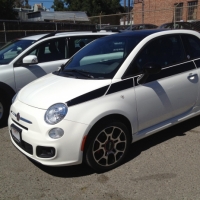Internet-Enabled Cars Will Change How We Drive

The Institute of Electrical and Electronics Engineers predicts that by the year 2025, 60 percent of the vehicles on the road will be Internet-enabled. This increased connectivity will mean more safety and convenience in your futuristic commute.
“The widespread adoption of connected cars will allow consumers to treat their vehicles as just another one of their devices,” Jeffrey Miller, an IEEE member and associate professor in the Computer Systems Engineering department at University of Alaska, Anchorage, said in a statement. “Hosting mobile operating systems and purchasing data packages from wireless providers will be commonplace in the future.”
Manufacturers already are equipping cars with Bluetooth and the ability to interact with mobile devices so that people can communicate with or through their vehicles. The next step is for technology to support interaction between the cars themselves.
“Through vehicle-to-vehicle communication, cars will be able to travel in closer proximity at faster speeds, as well as automatically reroute to avoid hazardous weather conditions or congested roadways,” Christoph Stiller, an IEEE member and professor at Karlsruhe Institute of Technology in Germany, said in the statement.
For instance, if a car is broken down in a traffic lane, it could alert other vehicles to avoid an accident and to move into another lane that isn’t blocked. A number of manufacturers are working on car-to-car communication, which would use a dedicated band of the Wi-Fi spectrum to convey information.
If you’re thinking that all these automated features are basically making humans obsolete when it comes to driving, you’re not far off. IEEE senior member Alberto Broggi, a professor of computer engineering at Italy's University of Parma, said he believes there will be lanes dedicated for the specific use of autonomous vehicles in the next five years. Driving will become more of a “novelty,” he predicts, and “people will actually pay to drive cars manually similar to go-carts.”
Surely no one would argue with technology that makes your commute to work safer or could help you avoid sitting in gridlocked traffic. And considering that many people today seemingly can’t live without their smartphones, which didn’t even exist a few years ago, it’s easy to imagine Internet-enabled cars quickly becoming ubiquitous.
One caveat, however: As vehicles are equipped with wireless communication and computer-controlled devices, connected cars will become increasingly vulnerable to software hacks. In some recent demonstrations, security experts were able to slam the brakes, jerk the steering wheel, and even shut down the engine of a high-tech car. It took the testers months to break into the vehicles’ computers, and there hasn’t yet been a real-world instance of a hacker remotely controlling a car. But tech-savvy hijackers could be a possibility for these cars of tomorrow.
“The more technology they add to the vehicle, the more opportunities there are for that to be abused for nefarious purposes,” said Rich Mogull, CEO of Securosis, a security research firm. “Anything with a computer chip in it is vulnerable, history keeps showing us.”

